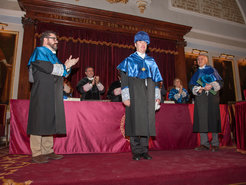Professor Ignacio Cirac receives the Honorary Doctor from the University of Valencia
Professor Ignacio Cirac, Director at the Max Planck Institute of Quantum Optics (Garching, near Munich) and leader of the Theory Division, has received the honorary title of a “doctor honoris causa” from the University of Valencia.
The ceremony took place in the historical hall called “La Nau”, on Friday, 30 January 2015. Prof. Cirac received the insignia – a hat, a pair of gloves, and a ring – from the rector of the university, Prof. Esteban Morcillo Sánchez. The Laudationes were held by Prof. Germán Valcárcel, who has a Chair for Optical Science at the Department of Physics. Prof. Valcárcel emphasized the long standing and close bonds between Prof Cirac and his faculty. He drew special attention to the high commitment of the renowned quantum physicist to advance science in Spain.

Founding date of the Universitat de València which emerged from clerical education institutions is 30 April 1499. The official opening ceremony took place on 13 October 1502 after Pope Alexander VI and King Ferdinand II had signed the ratification documents. Today the University has more than 90 departments and 16 research institutes. It is member of a network of Catalonian Universities and of the European University Association.
Prof. Cirac has had good and close relations to the Faculty of Physics of the University of Valencia for many years. In particular, he has collaborated with Dr. Armando Pérez Cañellas, who was one of the nominators for the Honoraray Doctor, and with Dr. Eugenio Roldán Serrano. At present, a couple of promising young scientists who have obtained their education in physics in Valencia are working in the group of Prof. Cirac at MPQ, for example Dr. Mari Carmen Bañuls.
At the centre of Prof. Cirac’s research is the development of a new information theory based on the laws of quantum mechanics. New ways of controlling the world of atoms, molecules, and photons are being explored in order to exploit their quantum mechanical properties for storing and communicating quantum information with ever higher efficiency and security. These investigations are leading to new concepts for quantum computers – devices based on a system of quantum particles that serve to store and encode information. The Theory Division of Prof. Cirac has for example developed new concepts for logical elements such as quantum gates that have already been implemented by experimental physicists. Furthermore, the group develops new algorithms for quantum communication, designs new quantum networks making use of the special properties of quantum particles, and creates new theoretical tools to characterize and quantify e.g. entanglement of remote quantum systems.
Another strong focus of his theoretical research is the simulation of the behaviour of quantum many-body systems with ultracold atoms in optical lattices. For example, such systems can serve as models for solid states crystals. This work will lead to a better understanding of macroscopic phenomena such as magnetism and superconductivity, but it also aims at getting a deeper understanding about the true nature of light and matter.
Information on the person:
Professor Ignacio Cirac was born in the City of Manresa in 1965. He studied theoretical physics at the Universidad Complutense de Madrid where he received his PhD in 1991. He began his career in physics as a “Professor Titular” at the Universidad de Castilla-La Mancha where he stayed till 1996. In 1996 he became Professor at the department of Theoretical Physics at the University of Innsbruck. Here he began his strong scientific collaboration with Professor Peter Zoller. Since 2001 he is Director at the Max Planck Institute of Quantum Optics and head of the Theory Division.
Professor Ignacio Cirac has by now become one of the most renowned scientists in the field of quantum information and quantum computation. E.g., in 2005 he was awarded the “Quantum Electronics Prize” of the European Science Foundation. In May 2006 he was the youngest ever winner of the renowned Royal Spanish Prince of Asturias Prize, and in the same year he received the International Quantum Communication Award together with Professor Peter Zoller. In 2009 he shared the “Frontiers of Knowledge Award in Basic Sciences” of the Spanish BBVA Foundation as well as the Benjamin Franklin Medal of the Franklin Institute in Philadelphia (USA) with Professor Peter Zoller. In January 2013 he received both the Israeli Wolf Prize and the Niels Bohr Medal. Last year Prof. Cirac received the Honorary Doctor from the University of Zaragoza. Olivia Meyer-Streng
